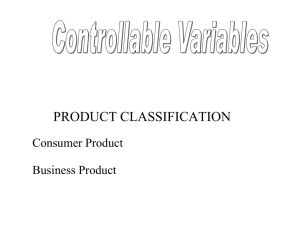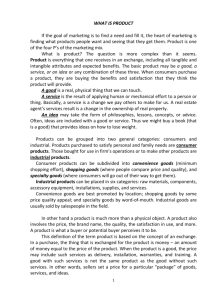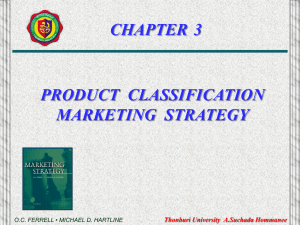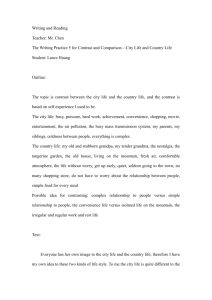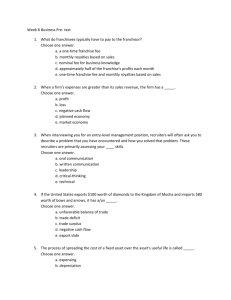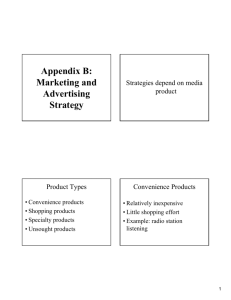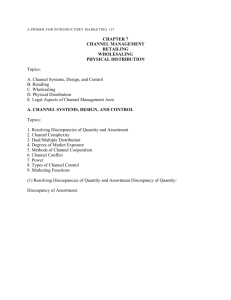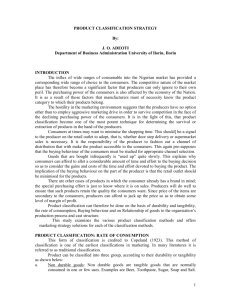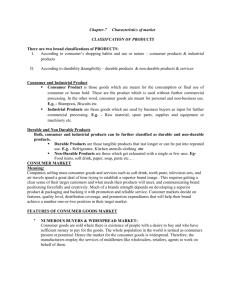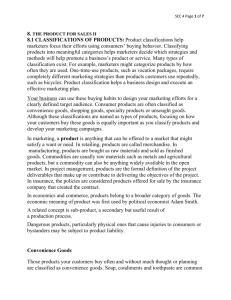A Product - QuestGarden.com
advertisement
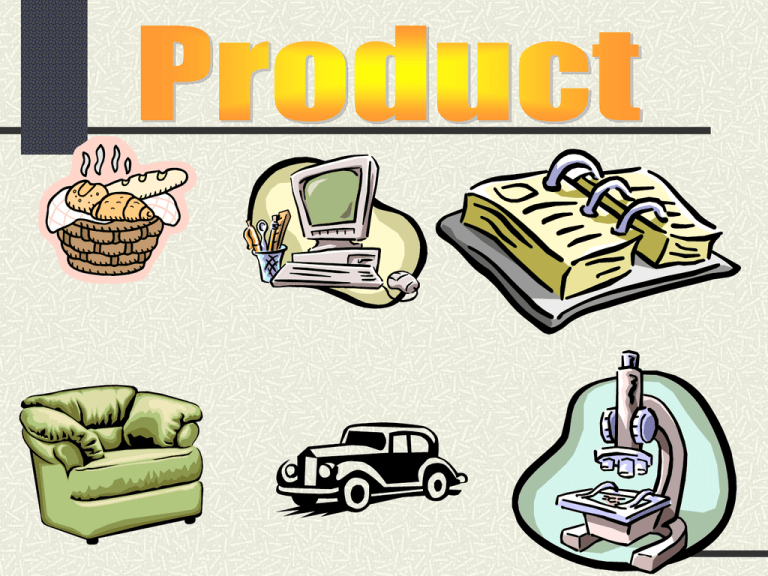
A Product is everything one receives in an exchange, including all tangible and intangible attributes and expected benefits. A Classic Sport Football for example, includes not only the ball itself but also instructions, an inflation needle, and a warranty. A car includes a warranty, owner’s manual, and perhaps free emergency road service for a year. Some of the intangibles that may go with the car include status associated with the ownership and memories generated from rides. Developing and managing products effectively is crucial to an organization’s ability to maintain successful marketing mixes. A product may be a good, service, or idea. A good is a real, physical thing that we can touch, such as a Classic Sport football. A service is the result of applying human or mechanical effort to a person or thing Basically a service is a change we pay others to make for us. A real estate agent’s services result in a change in the ownership of real property. A barber’s services result in a change in your appearance. An idea may take the form of philosophies, lessons, concepts, or advice. Often ideas are included with a good or service. Thus we may buy a book (a good) that provides ideas on how to lose weight. Or we may join Weight Watchers for ideas on how to lose weight and for help (services) in doing so. PRODUCT CLASSIFICATION Consumer Product Business Product PRODUCT CLASSIFICATION Consumer Product A product bought to satisfy personal and family needs. There are three categories of consumer products. PRODUCT CLASSIFICATION Consumer Product These groupings are based primarily on characteristics of buyer’s purchasing behavior PRODUCT CLASSIFICATION0- Consumer Products •Convenience Products •Shopping Products •Specialty Products Convenience Products Is a relatively inexpensive, frequently purchased item for which buyers want to exert only minimal effort. The buyer spends little time in planning the purchase of a convenience item or in comparing available brands or sellers. Convenience Products Examples of convenience products are : •Bread •Gasoline •Newspapers •Chewing Gum •Soft Drinks Shopping Products Is an item for which buyers are willing to expend considerable effort on planning and making the purchase. Buyers allocate ample time for comparing stores and brands with respect to prices, product features, qualities, services, and warranties. Shopping Products Examples of shopping products are : •Appliances •Furniture •Men’s Suites •Bicycles •Cellular Phones Shopping Products These products are expected to last for a fairly long time and thus are purchased less frequently than convenience items Specialty Products It possesses one or more unique qualities for which a buyer is willing to expend considerable purchasing effort. Buyers actually know what they want and will not accept a substitute. Specialty Products In searching for specialty products, purchasers do not compare alternatives Specialty Products Examples of specialty products are : •Unique Sports Cars •Rare imported wine •Specific type of antique china •Special handcrafted furniture PRODUCT CLASSIFICATION Consumer Product Business Product PRODUCT CLASSIFICATION Business Product A product bought for resale, for making other products, or for use in a firm’s operation PRODUCT CLASSIFICATION- Business Products •Raw Materials •Major Equipment •Accessory Equipment •Component Part PRODUCT CLASSIFICATION- Business Products •Process Material •Supply •Business Service Raw Materials Is a basic material that actually becomes part of a physical product. It usually comes from mines, forests, oceans, or recycled solid wastes. Raw Materials Raw materials usually are bought and sold according to grades or specification. Raw Materials Examples of Raw Materials are : •Gravel •Trees •Aluminum •Wood •Copper •Cow •Tomato Major Equipment Includes large tools and machines used for production purposes. Some major equipment is custom-made for a particular organization, but other items are standardized products that perform one or several tasks for many types of organizations. Major Equipment Examples of Major Equipment are : •Cranes •Bulldozers •Furnaces •Dump Truck •Oven •Printing Press Accessory Equipment Is standardized equipment used in a firm’s production or office activities. Compared with major equipment, accessory items are usually much less expensive and are purchased routinely with less thought. Accessory Equipment Examples of Accessory Equipment are : •Hand tools •Computers •Carts •Calculators •Pots, Pans, Utensils, Plates Component Part Is part of a physical product and is either a finished item ready for assembly or a product that needs little processing before assembly. Component Part Examples of Component Parts are : •Tires •Computer chips •Switches Process Material Is used directly in the production of another product. Unlike a component part, a process material is not readily identified in a finished product. Process Material Like raw materials, process materials are purchased according to industry standards, grades, and specifications. Process Material Examples of Process Material are : •Preservatives or additives •Industrial Glue •Dyes Supply Facilitates production and operations, but it does not become part of the finished product. Supply Examples of Supply are : •Paper •Pencil •Oil •Cleaning Agents Business Service An intangible product that an organization uses in its operations. Purchasers must decide if they want to do their own services or to hire them from outside the organization. Business Service Examples of Business Services are : •Financial •Rubbish •Marketing/Advertising •Janitorial •Legal PRODUCT CLASSIFICATION NOTE: A single item can be both a consumer and a business product. A broom is a consumer product if you use it in your home. However, the same broom is a business product if you use it in the maintenance of your business. PRODUCT CLASSIFICATION NOTE: After a product is classified as a consumer or business product, it can further categorized as a particular type of consumer or business product.
